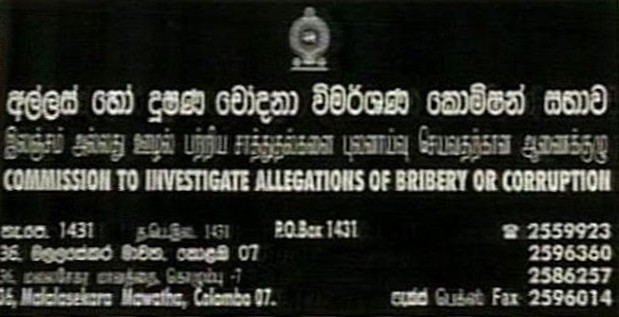A storm is brewing between Sri Lanka’s anti-corruption watchdog and the government over one simple question: who holds the purse strings?
The Commission to Investigate Allegations of Bribery or Corruption (CIABOC) says the law is clear—it should control its own finances. The Finance Ministry disagrees, citing a newer law that puts all public spending under its watch. At the heart of this clash are two Acts passed barely a year apart: the Anti-Corruption Act (ACA) of 2023 and the Public Financial Management Act (PFMA) of 2024.
“One Hundred Percent Independent”
CIABOC Director General Ranga Dissanayake, a former High Court Judge, insists the ACA was designed to create a fully independent Bribery Commission. Under that law, CIABOC prepares its own budget, sends it to the Speaker, and—once Parliament approves—receives funds into a dedicated account. The DG, as Chief Accounting Officer, can then spend as needed for investigations and prosecutions.
But the Finance Ministry argues the The Public Financial Management Act (PFMA) Act trumps the ACA. Its rules require every rupee to pass through Treasury procedures. That means CIABOC cannot operate freely—and two years after the ACA came into force, its special fund remains empty.
The Public Financial Management Act (PFMA) of 2024 in Sri Lanka is a law designed to strengthen the management, oversight, and control of public funds, improve fiscal policy for better macroeconomic management, and increase transparency and accountability. It establishes a modern framework for budgeting, expenditure control, and debt management, and requires the government to identify and manage fiscal risks by preparing a Fiscal Risk Statement (FRS).
Not Just CIABOC
The Audit Service Commission, promised similar independence under the National Audit Act of 2018, faces the same roadblock. Finance officials insist the PFMA prevails across the board.
A Legal Grey Zone
The ACA lays out a clear process: CIABOC’s budget goes to the Speaker, not the Treasury. The Speaker tables it in Parliament, seeks Finance Ministry observations, and—once approved—includes it in the national budget. The ACA even creates a CIABOC Fund to receive parliamentary allocations, donations, fines, and proceeds from confiscated property.
CIABOC can also hire staff and set pay scales, subject to parliamentary approval. But in practice, the Finance Ministry demands sign-off on all cadres and salaries, forcing the Commission to rely on secondments.
The Core Question
Which law takes precedence—the ACA or PFMA? The ACA became law in September 2023; the PFMA followed in August 2024. The Finance Ministry says the later law wins. It requires all entities to submit estimates to the Treasury Secretary and forbids spending without a Finance Minister’s warrant under Article 150 of the Constitution.
Flashpoint
The standoff escalated after Mr Dissanayake took office in January. He sent CIABOC’s budget directly to the Speaker and proposed its own staffing plan—breaking with Treasury norms. The Finance Ministry ordered compliance; the Speaker asked the Attorney General for a ruling. Months later, no opinion has arrived.
“If the AG says PFMA prevails, I’ll seek an amendment,” Mr Dissanayake told the Sunday Times. “If that fails, the Supreme Court is the last resort.”
Money Matters
CIABOC hasn’t been denied funds—its 2025 allocation is Rs. 1.37 billion, up from Rs. 950 million last year. But its dedicated fund remains dry. The government has promised Rs. 66 million, yet the procedural deadlock persists.
Why It Matters
This isn’t just a budget fight. It’s about institutional independence versus centralised control. Can anti-corruption bodies truly be autonomous if they depend on the Treasury for every rupee? Or does fiscal discipline demand uniform rules?
For now, the answer lies with the Attorney General—and possibly the Supreme Court.
( With the inputs from a Sunday Times story written by Namini Wijedasa)
